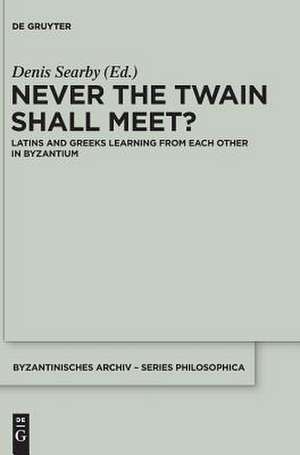Never the Twain Shall Meet?: ISSN, cartea 2
Editat de Denis Searbyen Limba Engleză Hardback – 18 dec 2017
Din seria ISSN
-
 Preț: 129.44 lei
Preț: 129.44 lei - 9%
 Preț: 615.52 lei
Preț: 615.52 lei -
 Preț: 216.27 lei
Preț: 216.27 lei -
 Preț: 290.52 lei
Preț: 290.52 lei -
 Preț: 135.05 lei
Preț: 135.05 lei - 9%
 Preț: 612.70 lei
Preț: 612.70 lei -
 Preț: 100.39 lei
Preț: 100.39 lei - 9%
 Preț: 618.30 lei
Preț: 618.30 lei -
 Preț: 105.14 lei
Preț: 105.14 lei -
 Preț: 158.75 lei
Preț: 158.75 lei - 9%
 Preț: 623.90 lei
Preț: 623.90 lei -
 Preț: 166.17 lei
Preț: 166.17 lei - 9%
 Preț: 612.93 lei
Preț: 612.93 lei - 18%
 Preț: 613.37 lei
Preț: 613.37 lei -
 Preț: 161.64 lei
Preț: 161.64 lei -
 Preț: 213.58 lei
Preț: 213.58 lei - 9%
 Preț: 1218.32 lei
Preț: 1218.32 lei -
 Preț: 218.45 lei
Preț: 218.45 lei - 9%
 Preț: 609.69 lei
Preț: 609.69 lei - 9%
 Preț: 605.28 lei
Preț: 605.28 lei - 9%
 Preț: 812.89 lei
Preț: 812.89 lei -
 Preț: 324.61 lei
Preț: 324.61 lei - 9%
 Preț: 616.32 lei
Preț: 616.32 lei - 9%
 Preț: 1407.29 lei
Preț: 1407.29 lei -
 Preț: 140.41 lei
Preț: 140.41 lei -
 Preț: 148.05 lei
Preț: 148.05 lei -
 Preț: 237.96 lei
Preț: 237.96 lei -
 Preț: 134.16 lei
Preț: 134.16 lei -
 Preț: 216.17 lei
Preț: 216.17 lei -
 Preț: 124.94 lei
Preț: 124.94 lei -
 Preț: 165.33 lei
Preț: 165.33 lei -
 Preț: 167.40 lei
Preț: 167.40 lei -
 Preț: 225.57 lei
Preț: 225.57 lei -
 Preț: 124.87 lei
Preț: 124.87 lei -
 Preț: 119.58 lei
Preț: 119.58 lei -
 Preț: 321.55 lei
Preț: 321.55 lei -
 Preț: 278.21 lei
Preț: 278.21 lei -
 Preț: 216.65 lei
Preț: 216.65 lei -
 Preț: 124.33 lei
Preț: 124.33 lei -
 Preț: 227.45 lei
Preț: 227.45 lei - 9%
 Preț: 618.12 lei
Preț: 618.12 lei - 8%
 Preț: 548.78 lei
Preț: 548.78 lei -
 Preț: 225.19 lei
Preț: 225.19 lei -
 Preț: 227.89 lei
Preț: 227.89 lei -
 Preț: 220.59 lei
Preț: 220.59 lei -
 Preț: 228.32 lei
Preț: 228.32 lei -
 Preț: 199.10 lei
Preț: 199.10 lei -
 Preț: 174.42 lei
Preț: 174.42 lei -
 Preț: 186.94 lei
Preț: 186.94 lei
Preț: 812.96 lei
Preț vechi: 1055.80 lei
-23% Nou
Puncte Express: 1219
Preț estimativ în valută:
155.57€ • 161.50$ • 129.73£
155.57€ • 161.50$ • 129.73£
Carte tipărită la comandă
Livrare economică 24 martie-07 aprilie
Preluare comenzi: 021 569.72.76
Specificații
ISBN-13: 9783110559583
ISBN-10: 3110559587
Pagini: 370
Dimensiuni: 175 x 246 x 26 mm
Greutate: 0.81 kg
Editura: De Gruyter
Colecția ISSN
Seria ISSN
ISBN-10: 3110559587
Pagini: 370
Dimensiuni: 175 x 246 x 26 mm
Greutate: 0.81 kg
Editura: De Gruyter
Colecția ISSN
Seria ISSN
Notă biografică
Many readers of this volume will have been brought up on the notion that 'East' and 'West' are clearly delineated ideological and ecclesial categories. This book challenges the acceptance of that dichotomy as a drastic over-simplification. It aims to transcend the often polemically motivated scholarship of the nineteenth and twentieth centuries by emphasizing shared frames of reference between the Greek East and Latin West.
The contributions in this book point not only to Greeks and Latins learning from each other but also to Greeks and Latins learning together. The divergences between late Byzantine and Latin philosophy and theology can be even more interesting than the similarities, since they manifest a commonality and synchronism between East and West that is richer and more complex than the phenomenon of mere borrowing or assimilation.
In addition to broader, diachronical surveys, the East-West dichotomy is examined through case-studies of the writings of key figures such as Palamas, Scholarios, Demetrios Kydones, Bessarion, Plethon and others. The results will be surprising for those accustomed to conceiving of the Greek East and Latin West as somehow radically opposite.
The contributions in this book point not only to Greeks and Latins learning from each other but also to Greeks and Latins learning together. The divergences between late Byzantine and Latin philosophy and theology can be even more interesting than the similarities, since they manifest a commonality and synchronism between East and West that is richer and more complex than the phenomenon of mere borrowing or assimilation.
In addition to broader, diachronical surveys, the East-West dichotomy is examined through case-studies of the writings of key figures such as Palamas, Scholarios, Demetrios Kydones, Bessarion, Plethon and others. The results will be surprising for those accustomed to conceiving of the Greek East and Latin West as somehow radically opposite.
